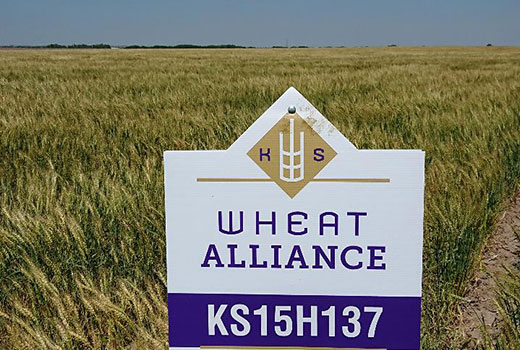
The wheat breeding program at the Agricultural Research Center in Hays will release a new hard red winter wheat variety later this year. | Download this photo.
Hays research center to release new hard red wheat
Variety improves disease resistance of previous western Kansas lines
June 11, 2020
HAYS, Kan. – A researcher at the Agricultural Research Center in Hays has taken a good thing and made it even better.
Wheat scientist Guorong Zhang announced in early June that he is ready to release a hard red winter wheat variety that is suited for the drier, western Kansas climate. The new variety does not yet have a name, but it builds off the success of a hard red wheat released just one year earlier, KS Dallas.
“This variety has high yield potential and strong resistance to wheat streak mosaic virus, similar to KS Dallas,” Zhang said. “But it also has good resistance to stripe rust, Hessian fly and soilborne mosaic virus, which KS Dallas does not have.”
In trials held from 2017 to 2019, KS Dallas averaged yields of 79.8 bushels per acre, giving Zhang a pretty good indication of the yield potential for his new variety.
He is expecting to apply to the K-State plant genetic material release committee for its release this summer and if approved, the variety will be named and foundation seed released this fall, he said.
The wheat improvement program at the research center in Hays has been developing varieties suited to western Kansas since the early 1900s. The center works in cooperation with the wheat improvement program at K-State’s main campus in Manhattan, which focuses on new varieties for central and eastern Kansas.
Zhang said the Hays program’s goals for hard winter wheat include high yield, good end-use qualities and drought tolerance. Historically, researchers there have focused on varieties that carry resistance to wheat streak mosaic virus, Triticum mosaic virus, barley yellow dwarf virus, stripe rust, leaf rust, stem rust and Hessian fly.
In 1987, the Hays program shifted its focus to hard white winter wheat varieties, which are thought to provide superior flour for such products as yeast breads, hard rolls and noodles. Recently, however, Zhang said the program is shifting more efforts to improve its hard red varieties, which are in higher demand among farmers.
For more information on the wheat breeding program at the Agricultural Research Center in Hays, visit its website or call the center at 785-625-3425.

